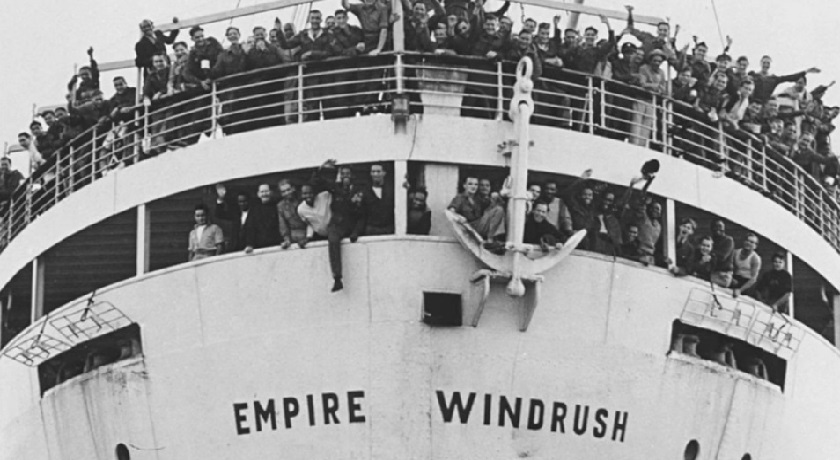 Today (22 June 2018) the United Reformed Church joins in the nationwide celebrations marking the 70th anniversary of the SS Empire Windrush arriving in Tilbury docks carrying passengers from the Caribbean.
Today (22 June 2018) the United Reformed Church joins in the nationwide celebrations marking the 70th anniversary of the SS Empire Windrush arriving in Tilbury docks carrying passengers from the Caribbean.
They, along with many others who had arrived by different means, had responded to the British government’s call to assist with post-war reconstruction.
The contributions made by the ‘Windrush generation’ towards British social, cultural and political life has been invaluable and been well documented.
In honour of the arrival of the Windrush, the Revd Dr Michael Jagessar, Secretary for Global and Intercultural Ministries for the URC, introduces a short film entitled 'Longing to Belong: A Windrush generation story', scripted by the Revd Richard Becher, Minister for Broadway URC, East Sussex, and filmed by Kevin Snyman, Mission Enabler for West Midlands Synod.
The film tells the story of Mandy's love and appreciation for her grandmother, Agatha. Agatha arrived in the UK on the Windrush in 1948, and had to deal with loss, prejudice and racism in her struggle for equality. Mandy shares Agatha's inspirational story with her daughter - Agatha's great grand-daughter - Aggie, a proud descendent of the Windrush Generation.
Dr Jagessar also discusses how the passengers might have felt arriving in the UK; their subsequent experiences and the post-colonial legacy.
‘We’re celebrating 70 years of joys, afflictions, anguish, despair, risings-up, and contributions in putting ‘great’ back into Britain. I smile at the thought of those proud citizens of Great Britain’s Commonwealth leaning over the sides of the Empire Windrush to catch a glimpse of the imagined motherland they were schooled about through their Royal Readers (school books); and then the sadness experienced as their dreams soon turned to shock and dismay at the reality of the hostile environment in which they found themselves. Yet their resilience, creativity, and faith saw them through.
‘This ‘hostile environment’ mantra may be a newly coined term from our current prime minister, but as the reality of the Caribbean and the Windrush experience demonstrates, it is not new.
‘For example, consider the observation of ER Brathwaite, the author of To Sir, with Love, an autobiography about his experience teaching in a London school in 1949. Despite his Second World War service record, fighting for Britain in the Royal Air Force and degree from Cambridge University in Physics, he sought employment and was denied numerous times with what he termed: “Elaborate casualness and courtesy, for reasons which seemed to have nothing to do with my abilities or qualifications.” He surmised: “I was forced to confront the simple fact that, relieved of the threat of German invasion, the British had abandoned all pretence of hand-in-hand brotherliness and had reverted to type, demonstrating the same racism they had so roundly condemned in the Germans.”
‘Let’s not fool ourselves; some things may have changed, but Britain has always been a hostile environment’ for the ‘other’; and what is happening today in a wider and ongoing struggle around “Brexit, borders and belonging” has its roots in Britain’s history as an ‘empire’. Whether we own it or not, this is the reality. We are all implicated, including the Church.
‘Consider also the example of the late Philip Potter, the first Black General Secretary of the World Council of Churches which is also celebrating its 70th anniversary. Originally from Dominica, Mr Potter worked with the Methodist Missionary Society between 1961-1966 and his experience relates to the recent Windrush debacle.
Though well-known and employed by the Methodist Church, he had to suffer the humiliation of being reminded that he was a black stranger in an exclusive white society. The Commonwealth Immigration Act of 1962 meant that his passport and commonwealth status were constantly challenged and questioned at British airports even though he was a resident of the UK and carried a British Passport.
‘Responding to the interpretation of the Immigration Act as offered by a prominent lawyer, Mr Potter wrote in his book Full Life for All: The Work and Theology of Philip Potter: “I quite understand that I am at the mercy of the British government, being both a British subject and undesirable alien. Therefore, I, with thousands of others, must bear whatever humiliations are inflicted with such fortitude as one can muster.”
‘Britain is home for all of us and we need to hope for a better future for all – for we are all in need here. At various levels we all ‘long to belong’ for there is much that is systemic which continue to displace and marginalise in intersecting ways. Native or non-native; just arrived or long-time dweller here; born here or born elsewhere – in different ways we can feel a stranger or made to feel strange in a place where we should belong. Each of us has a responsibility to imagine a different world: a place of welcome and hospitality for all. A ‘hostile environment’ is not the way of Jesus. The Jesus way of abundant life for all must mean a space (John 10:10) where all can move freely in and out, finding themselves and each other. Herein lies the calling of the Church – our saltiness.’
A collection of free resources and worship materials have been produced to help congregations celebrate the anniversary.
Picture: A still of passengers aboard the SS Empire Windrush: Youmanity Official/Metropolitan Police/YouTube




